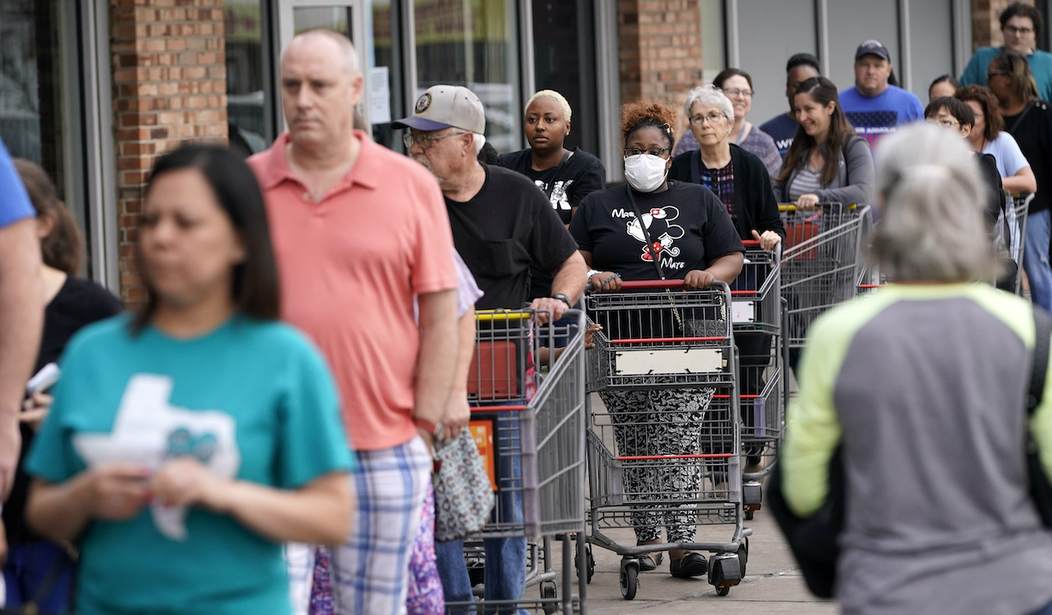With the House passage of Speaker Nancy Pelosi's $3 trillion HEROES Act, COVID-19 policy has now officially transformed into presidential politics 2020.
Let's recall that prior to the crisis, the nation appeared quite pleased with the leadership that President Donald Trump was providing.
The economy was growing at a brisk pace, with job creation robust and unemployment rates at historic lows.
In February, Gallup's monthly measure of national satisfaction hit 45 percent, the highest since 2004. During former President Barack Obama's eight years, it hovered between 20 percent and 30 percent.
Then the coronavirus hit.
The national satisfaction index dropped to 30%. The latest for May creeped up to 32 percent.
Coronavirus politics really has telescoped the core debate that was going on in the country before it.
Are we a nation driven by government or by people?
The theme of President Trump's 2016 campaign was draining the Washington swamp and returning America to its citizens, and he had been governing -- tax cuts, deregulation -- true to this theme, with great results.
COVID-19 has taken things in the opposite direction.
Shutdown policies and massive government action returned focus to government.
Few would argue that there was any alternative.
The question is: What now?
Drilling down further into the Gallup satisfaction poll, we find that practically all the drop has been with Republicans.
Before the crisis, satisfaction among Republicans was at 80 percent. Now it's 48 percent. Among Democrats, there has been hardly any change.
From April to May, the percentage of Republicans saying the coronavirus is the most important problem facing the country dropped from 47 percent to 35 percent. Among Democrats, there was practically no change: 46 percent in April and 45 percent in May.
Recommended
The number of Republicans saying the economy/jobs is the most important problem increased from 13 percent in April to 17 percent in May. Among Democrats, again there was practically no change: 6 percent in April and 7 percent in May.
It seems clear that Republicans are restless to start returning the country to freedom and Democrats are happy to leave leadership with government.
Pelosi's HEROES Act is responding to this.
We're already in uncharted territory regarding government.
Prior to this crisis, trillion-dollar deficits were news.
Back in 2018, a group of leading scholars from Stanford University's Hoover Institute -- including former Secretary of State George Shultz, former Council of Economic Advisers Chair Michael Boskin and former Treasury Undersecretary for International Affairs John Taylor -- authored a piece in The Washington Post titled "A Debt Crisis is on the Horizon." They warned of the dangers of the deficit-increasing from $800 billion to a trillion and national debt increasing from $15 trillion to $20 trillion.
The Congressional Budget Office now estimates that the fiscal 2020 deficit will be $3.7 trillion.
This was recently updated by Brian Riedl of the Manhattan Institute with an estimate of $4.2 trillion. Riedl projects deficits for the next 10 years averaging almost $2 trillion per year. He estimates national debt reaching $41 trillion by 2030, or 128 percent of our gross domestic product.
Despite these mind-boggling figures, Nancy Pelosi wants to serve up to the nation another $3 trillion in spending, including a trillion to bail out states, extending the $600 weekly benefit above unemployment insurance, a new round of cash payments to individuals -- including payments to undocumented workers -- billions in housing assistance, etc.
We're at the fork in the road, and this fork will define presidential politics in 2020.
Has government done the major part of its thing to help us get through the coronavirus crisis, or are we going to keep moving to a new welfare state and socialist America?
Sentiments gleaned from the polls show the Republicans are ready to start turning things back to individuals.
Democrats? The Heroes Act says it all.
Government or freedom? This is the question pointing to November.
Star Parker is president of the Center for Urban Renewal and Education and author of the new book "Necessary Noise: How Donald Trump Inflames the Culture War and Why This is Good News for America."

























Join the conversation as a VIP Member